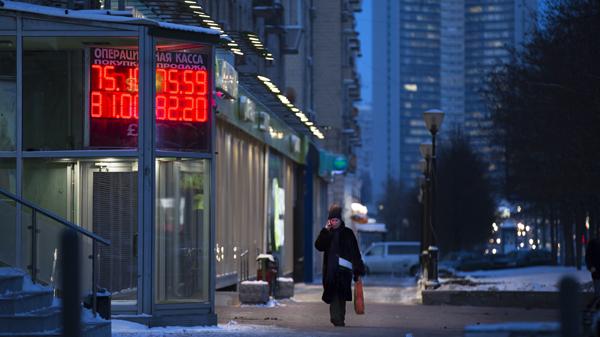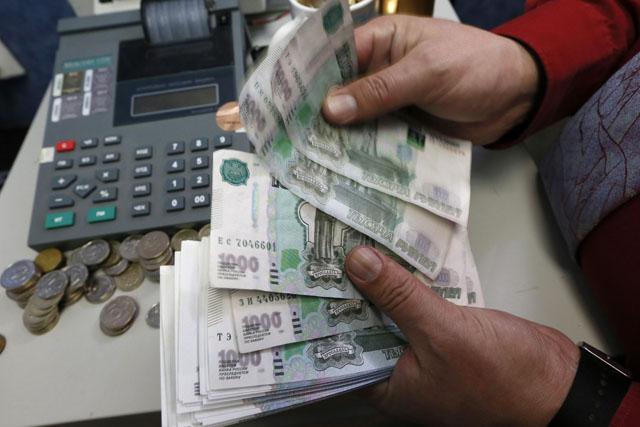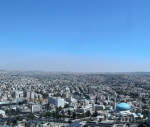You are here
Western sanctions 'severely' harming Russia — Putin
By AFP - Jan 12,2016 - Last updated at Jan 12,2016

A woman walks past at an exchange office sign showing the currency exchange rates of the Russian ruble, US dollar, and euro in Moscow, Russia, on Monday (AP photo )
BERLIN — President Vladimir Putin acknowledged Monday in an interview with German daily Bild that Western economic sanctions over the Ukraine crisis are affecting Russia.
"Concerning our possibilities on the international financial markets, the sanctions are severely harming Russia," he said in a long interview, calling the European Union (EU) sanctions "a theatre of the absurd".
Moscow has been hit by US and European sanctions over the conflict between pro-Russian separatists and Ukrainian forces, which has claimed more than 9,000 lives since April 2014.
In late December, the EU extended its sanctions by six months, arguing that the Minsk peace agreement signed by Moscow has not been fully implemented.
Putin said, however, that "the biggest harm is currently caused by the decline of the prices for energy", according to an English-language transcript published by Bild online.
"We suffer dangerous revenue losses in our export of oil and gas, which we can partly compensate for elsewhere," he added.
"But the whole thing also has a positive side: if you earn so many petrodollars, as we once did, that you can buy anything abroad, this slows down developments in your own country," the Russian president elaborated.
Putin said Russia was now "gradually stabilising our economy".
"Last year, the gross domestic product had dropped by 3.8 per cent. Inflation is approximately 12.7 per cent. The trade balance, however, is still positive," he indicated. "For the first time in many years, we are exporting significantly more goods with a high added value, and we have more than $300 billion in gold reserves."
Separately, Moscow share prices on Monday dropped by more than 5 per cent as Russia's energy-dependent economy reels from low oil prices and fluctuations on the Asian market.
The dollar-denominated RTS index had dropped by 5.12 per cent at closing, while Russia's battered ruble fell to 76 against the dollar and over 83 against the euro for the first time since the currency slump of December 2014.
Russia's economy and the ruble have been battered since 2014 by the slide in oil prices and Western sanctions over Moscow's role in the Ukraine crisis.
But the continued slump in oil prices, with Brent crude trading below $33 on Monday, and worries over the state of China's economy pummelled Russia's markets and currency as trading began again following a break for the New Year and Orthodox Christmas holidays last week.
Analysts warned that if the price of oil continues to fall then that could mean even more trouble for Russia's economy just as officials were claiming that it was edging out of recession.
"If oil prices keep dropping, the ruble could have to continue to adjust itself," analysts from the VTB Capital said.
The World Bank has said that the full-year downturn for 2015 could have reached 4.3 per cent, given the low oil price, and that Russia is likely to remain in recession for all of 2016.
Experts remain sceptical that even an increase in the price of oil could not salvage the battered Russian
economy in 2016.
"Even a marked rebound in oil prices would be unlikely to spur a return to reasonable rates of economic growth and consumers in particular will remain under pressure," analysts from the Capital Economics research consultancy said.
Russia's finance minister predicted last month that 2016 would be a difficult year for his country's recession-hit economy, already reeling from low oil prices.
"2016 will not be simple," Anton Siluanov said in an interview with Russian state television. "The latest predictions show that the price of our main exports could be lower than predicted."
The country's 2016 budget had been calculated on an oil price of $50 per barrel, a figure President Putin said was an "optimistic" assessment of the situation.
Siluanov predicted the oil price would stay around $40 per barrel on average, and that spending cuts and privatisation measures would be integrated into the budget.
The Russian government has forecast the country's gross domestic product would increase 0.7 per cent next year, after falling 3.7 per cent in 2015.
Related Articles
Many Russians are buying dollars and hoarding cash, increasingly concerned by a slide in the ruble and wary of possible restrictions on bank withdrawals as President Vladimir Putin blames currency woes on speculators and the West.
Lower oil prices and Western financial sanctions imposed over the Ukraine crisis will cost Russia around $130-140 billion a year — equivalent to around 7 per cent of its economy — Finance Minister Anton Siluanov said on Monday.
Deep recession, skyrocketing prices and a fragile banking system: Although the ruble seems to have stabilised after its abysmal drop past week, Russia still faces the heavy consequences of the turbulence.















